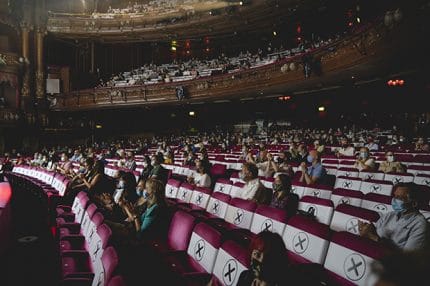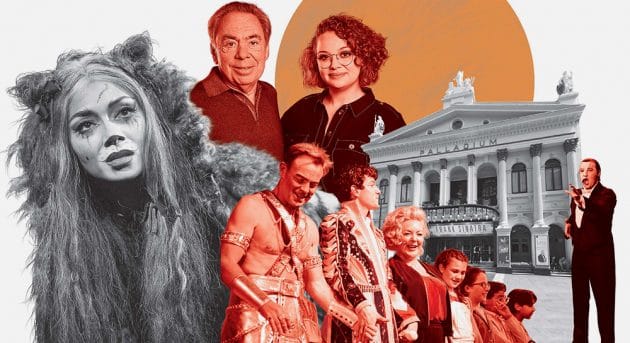Andrew Lloyd-Webber ushers in the reopening of live venues
COVID-19 Down-Stage Centre?
On Thursday 23rd July, singer Beverley Knight performed to a less-than-packed London Palladium, heralding a new post-COVID era for live theatre. Presiding over proceedings was 72-year-old theatre grandee and adamantine champion of the arts, Lord Andrew Lloyd-Webber, in tentative anticipation of UK venues reopening on 1st August.
Emerging from months of cultural privation, this experimental ‘pilot’ offered an insight into what the future holds for theatregoers. Reduced capacity and increased sanitisation were the order of the day. And the stakes were high: the very future of live theatre itself hovering on the precipice between survival and failure, with survival hinging on the efficacy of government-imposed safety measures. With health officials among the 640 spectators – all of whom Lloyd-Webber thanked for being ‘guinea pigs’ – the successful implementation of the stringent safety edict, which was announced on 17th July, was imperative. The musical maestro himself was keen to point out that this mock show was not restricted to illustrating the safety of visiting the Palladium, but to highlight that ‘every venue can work’. Dramatic tension indeed.
Safety First

Audience members at Thursday’s theatrical ‘vernissage’ would, no doubt, by now be all too familiar with many of the prophylactic measures they encountered: the ubiquitous floor markings, the one-way systems, the mandatory face masks, the temperature scanners. Social distancing was rigorously maintained, with masked ushers delivering refreshments to audience members in a bid to obviate congestion. In addition, the audience was subjected to staggered entry and its concomitant queueing, something that Broadway regulars would not find a novelty. What was novel, however, was the utilisation of a ‘fogging machine’, a device designed to chemically clean venues and protect against disease for four weeks, with plans to use it every two weeks as a precautionary measure. Most disquieting of all, perhaps: the sea of empty seats; the array of Xs – a mournful reminder that the coronavirus pandemic continues to take centre stage and, for now at least, has ruthlessly ousted the living, breathing audience which is the life-blood of live theatre.
While the efforts behind Thursday’s revival were inspiring, Lloyd-Webber was moved to admit that the cavernous view from the stage was ‘sad’, personifying the Palladium as ‘a theatre that wants to love you’. The impact of the pandemic was clear to see – that grand auditorium, with a capacity for an audience over two-thousand strong, housing a sparse 30% of that number. For the quintessential showman himself, this is saddening – Lloyd-Webber has long been advocating that social distancing is in theatre is simply not feasible, and that basic – yet rigorous – hygiene practices are sufficient to render venues Covid-secure. The theatre magnate has for some time pointed to South Korea as an illustrative example of safe reopening: back in May, he wrote to culture secretary Oliver Dowden, urging the use of some of the methods being employed in Seoul, where Phantom of the Opera has continued to be performed to a full house throughout the pandemic. In a country of 51 million, there have been fewer than 300 deaths, perhaps lending some weight to Lloyd-Webber’s solicitations.
An Economic ‘Tragedy’
The inevitably muted atmosphere engendered by social distancing will no doubt have an impact on the artistic front. All too real, however, is the economic impact: Lloyd-Webber has made it clear than venues need at least 65 percent capacity in order to be financially viable. And this is a bare minimum – large musical productions require a substantial proportion of seats to filled. Somewhat ominously, theatre producer Cameron Mackintosh recently announced that some of the West End’s top money-spinners will remain closed until next year. This is compounded by the results of an Indigo survey, indicating that large numbers of respondents would refrain from buying theatre tickets or attending mass gatherings for some months to come.
Audience numbers such as those on Thursday night are ‘a misery for performers’, according to Lloyd Webber himself. Despite Chancellor Rishi Sunak’s pledge to inject £1.7 billion emergency funding as a rescue package for the arts, the sector remains precarious. In June it was announced that the Southbank Centre, a high-profile victim of the economic damage wrought by Covid-19, would potentially remain closed until next spring, while fears that approximately 70 percent of theatres may be forced to close their doors permanently have not abated.
Last month, Alex Beard (Chief Executive of the Royal Opera House) expressed fears that the venue , without financial support, would struggle to survive past this autumn. Indeed, cutbacks have subsequently been made at this illustrious venue, such as drastically reducing the number of casual staff, citing ‘financial pressures’ caused by the pandemic. Oliver Dowden described the arts as the ‘lynchpin’ of the nation, with the government describing the financial support package as ‘the biggest ever one-off investment in UK culture’. Some would argue that this gesture is only commensurate with the ‘biggest ever’ health crisis the industry has ever faced, and continues to face. With countries like Germany, where the music arts enjoy a generous 80 percent subsidy as opposed to the more diminutive 20 percent in the UK, one can understand the fragile situation in which theatre land now finds itself. Little wonder that Lloyd-Webber conveys concern that social distancing could spell failure of tragic proportions for the future of live venues.
The Show Must Go On
Thursday night signaled a milestone in the industry’s recovery, a baby step toward reminding the universe of theatre’s unique ability to transport audiences and enrich lives, at least for a few hours. Its impact has been watched by the world, with Lloyd Webber described as have done ‘brilliantly’ and the evening hailed ‘a piece of history’. It is with febrile expectation that audiences await the return of packed theatres, showcasing iconic Lloyd-Webber extravaganzas such as Cats, Jesus Christ Superstar and Sunset Boulevard. A deadly and pugilistic enemy may have elbowed its way to down-stage centre for the past few months, attempting to obliterate all in its wake: clearly, that enemy did not reckon with the dogged resilience of Andrew Lloyd-Webber and his steadfast refusal to give up on all he holds dear.
In the tradition of classic theatre argot: The Show Must Go On!



